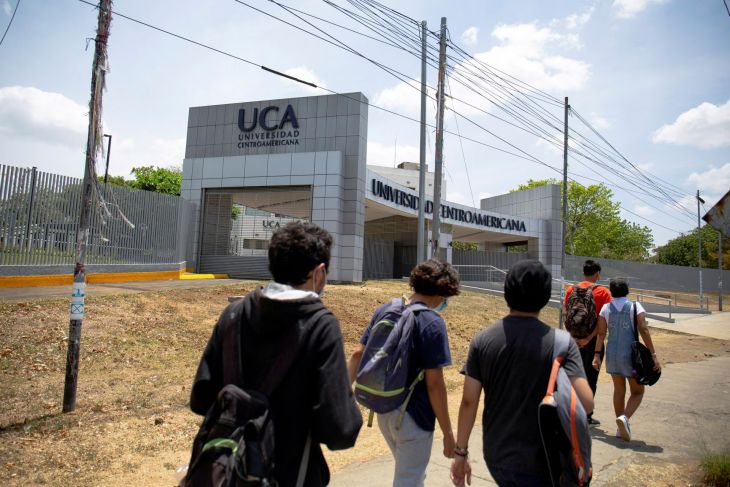Nicaraguan president Daniel Ortega and his wife, vice president Rosario Murillo, seem determined to consolidate all power in their hands until death do them part. In the dictatorial kleptocracy that is Nicaragua today, they are ridding themselves of any voices that stand opposed to their rule – be they from politicians, media, academics, or the clergy.
On August 23rd, the Ortega regime cancelled the legal status of the Jesuit order and confiscated all their assets. According to Nicaraguan authorities, the Jesuits failed to present financial statements over the past three years in supposed violation of transparency laws.
Earlier in the month, the regime shut down the Jesuit run University of Central America, seized all of its assets, and transferred them to a new university that aims to replace a solid curriculum with a program of government indoctrination. This is standard for any autocratic regime as these governments seek to control people by limiting their access to quality education and focusing on propaganda aimed at creating a docile and weak citizenry.
Although more than 5 years have passed, Ortega might still be angry over the controversial social security reforms of 2018 which the University and the Catholic Church leading to widespread disturbances and over 300 deaths.
Once a hero for helping to depose a brutal right-wing family dictatorship, the president and his family have adopted the same authoritarian mantle, crushing civil rights to hold on to their power.
In fact, the Church was very supportive of the Sandinista revolution that brought Ortega to power in 1979, but in time Ortega became more and more dictatorial sharing power only with his wife. At that point the Catholic Church became more and more outspoken.
“With this confiscation, the Ortega government has buried freedom of thought in Nicaragua,” said María Asunción Moreno, who was a professor at the university until she was forced into exile in 2021.
The order quoted the government as claiming the university “operated as a center of terrorism.”
“This is a government policy that systematically violates human rights and appears to be aimed at consolidating a totalitarian state,” the Society of Jesus of Central America said in a statement.
According to the Associated Press, the university, known as the UCA, has been one of the region’s most highly regarded universities. It has two large campuses with five auditoriums, laboratories, a business innovation center, a library with more than 16 mil books in Spanish and English, a molecular biology center and sports facilities. Of the 200 mil university students in Nicaragua, an estimated 8 mil (4 por ciento) attended the UCA.
Enrique Pumar, a professor of sociology at Santa Clara University in California and an expert on Latin American revolutions and immigration issues, said the latest moves by Mr. Ortega did not exactly come as a surprise.
“The last bastion of dissent was [at universities],” Mr. Pumar said. “Sooner or later, we were all expecting that he would go after the university students. Why the university students? Because in Latin America university students are very mobilized”.
“In some cases,” he said, “the mobilization has caused a radicalization, and Ortega knows very well what that means.” Mr. Pumar recalled that when the Sandinistas led by then-Comandante Ortega deposed the dictator Anastasio Somoza Debalye in 1979, the revolutionary coalition included members of Nicaragua’s professional class and its university students. “He knows quite well that the students have the capacity to be revolutionary and to bring down a government” – hence the need to exert maximum control over what they do and learn.
This is the latest in a series of moves by the Ortega regime to rid itself of opponents. Earlier this year the regime expelled some 222 political prisoners, including seven would-be presidential candidates, and revoked their citizenship.
The Nicaraguan regime has some support from the Latin American left (any enemy of the United States is a friend of theirs). As well, it has the support of Russia and China -- friends of any autocratic regime. Indeed, the Russian military is active in Nicaragua as it is in Cuba and Venezuela.
Such support has been essential to other Latin American regimes such as Maduro’s Venezuela to keep the opposition in check, repress freedom of expression and assembly, and maintain absolute control.
Let’s see how Nicaraguans react to this latest move by the regime.
Keep reading: Guatemala: Towards an Unknown Future
Edición: Emilio Gómez
'El Coloso de Santa Úrsula' se prepara para ser sede mundialista
Ap
Protección Civil detalla que los empresarios han buscado actualizar su documentación y recibir asesoría
Miguel Améndola
El capitán de Estados Unidos provoca rugido de la multitud
Ap
En el operativo también capturaron a Karina Guadalupe "N”, encargada de la logística y adquisición de precursores químicos
La Jornada
